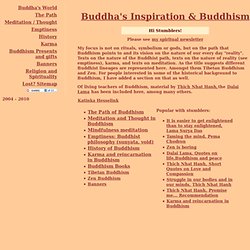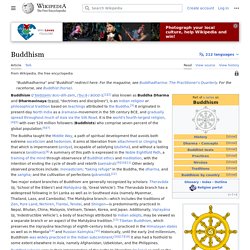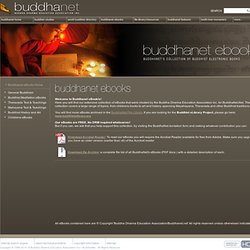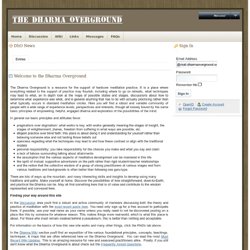

Buddha's World & Buddhism. Hi Stumblers!

Please see my spiritual newsletter My focus is not on rituals, symbolism or gods, but on the path that Buddhism points to and its vision on the nature of our every day "reality". Tibetan Buddhism Archives.
Mindfulness. Enlightenment (spiritual) Enlightenment refers to the "full comprehension of a situation".

[web 1] It is commonly used to denote the Age of Enlightenment,[note 1] but is also used in Western cultures in a religious context. It translates several Buddhist terms and concepts, most notably bodhi,[note 2] kensho and satori. Related terms from Asian religions are moksha (liberation) in Hinduism, Kevala Jnana in Jainism and ushta in Zoroastrianism. Perennialists and Universalists view enlightenment and mysticism as equivalent terms for religious or spiritual insight. The English term "enlightenment" has commonly been used to translate several Sanskrit, Pali,[web 2] Chinese and Japanese terms and concepts, especially bodhi, prajna, kensho, satori and buddhahood. Bodhi is a Theravada term. Prajna is a Mahayana term. In Zen, kensho means "seeing into one's true nature". Buddhahood is the attainment of full awakening and becoming a Buddha. [means] full awakening; buddhahood. Vivekenanda's modernisation has been criticized:
Buddhism. Religion founded by the Buddha Buddhism (, ) is an Indian religion based on a series of original teachings attributed to Gautama Buddha.

It originated in ancient India as a Sramana tradition sometime between the 6th and 4th centuries BCE, spreading through much of Asia. It is the world's fourth-largest religion[3] with over 520 million followers, or over 7% of the global population, known as Buddhists.[6] Buddhism encompasses a variety of traditions, beliefs and spiritual practices largely based on the Buddha's teachings (born Siddhārtha Gautama in the 5th or 4th century BCE) and resulting interpreted philosophies. Buddhism: Common Misconceptions. "Seven Blunders of the World" by Mahatma Gandhi.
Buddhanet Library. Welcome to Buddhanet eBook!

S! Here you will find our extensive collection of eBooks that were created by the Buddha Dharma Education Association Inc. for BuddhaNet.Net. The collection covers a large range of topics, from childrens books to art and history, spanning Mayahayana, Theravada and other Buddhist traditions. You will find more eBooks archived in the BuddhaNet File Library. If you are looking for the Buddhist eLibrary Project, please go here: www.buddhistelibrary.org Our eBooks are FREE. All eBooks contained here are © Copyright 'Buddha Dharma Education Association/Buddhanet.net' All rights reserved unless otherwised indicated. Audio Dharma - Welcome to Audio Dharma.
A Bite of Buddhism. The four sublime mental states are qualities of mind that we cultivate in order to alleviate the suffering we experience in everyday life and to feel more connected to others—and the worries and fears we all share. In the language of the Buddha (Pali), they are called the brahma viharas , which means "the dwelling place of awakened beings. " The good news for us unawakened beings is that it's easy to begin cultivating the brahma viharas . Indeed, they are an integral part of other religious, spiritual, and humanistic traditions. I present them here with a distinctly Buddhist "flavor. " Metta . I like to think of metta as the simple act of well-wishing. Wildmind Buddhist Meditation - Learn Meditation Online. How to Meditate - Guided Meditation Techniques - Buddhist Meditations.
Www.dharmaoverground.org - Home. The Dharma Overground is a resource for the support of hardcore meditation practice.

It is a place where everything related to the support of practice may flourish, including where to go on retreats, what techniques may lead to what, an in depth look at the maps of possible states and stages , discussions about how to determine what experience was what, and in general anything that has to do with actually practicing rather than what typically occurs in standard meditation circles.
Here you will find a robust and variable community of people with a wide range of experience levels, perspectives and interests, though all loosely bound by the same basic principles of empowering, helpful, engaged dharma and exploration of the possibilities of the mind. In general our basic principles and attitudes favor: There are lots of ways up the mountain, and many interesting skills and insights to develop using many traditions and paths. Make yourself at home.
Finding your way around this site. Investigating the Mind. Arhat (Buddhism) The understanding of the concept has changed over the centuries, and varies between different schools of buddhism and different regions.

A range of views on the attainment of arhats existed in the early Buddhist schools. The Sarvāstivāda, Kāśyapīya, Mahāsāṃghika, Ekavyāvahārika, Lokottaravāda, Bahuśrutīyas, Prajñaptivāda, and Caitika schools all regarded arhats as being imperfect in their attainments compared to buddhas.[4][5][6] Mahāyāna Buddhists are urged to take up the path of a bodhisattva, and to not fall back to the level of arhats and śrāvakas.[7] The arhats, or at least the senior arhats, came to be widely regarded as "moving beyond the state of personal freedom to join the Bodhisattva enterprise in their own way".
Etymology and translations[edit] Early uses[edit]